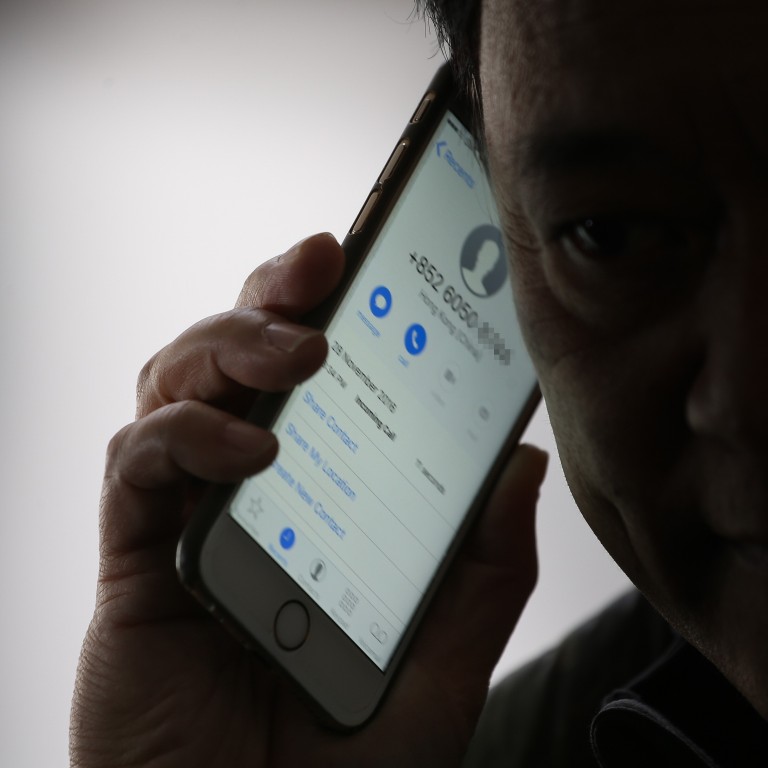
Elderly people in Hong Kong main targets as phone scams rise sharply, with victims losing HK$185 million in just five months
- One woman borrowed heavily to pay HK$2.4 million to scammers posing as mainland officials
- Wan Chai bank employee foiled attempt to get 80-year-old woman to open new online account
Fraudsters tricked more than 500 people in Hong Kong into parting with HK$185 million (US$23.9 million), keeping telephone scams on a sharply rising trend through the first five months of this year.
There were 532 cases from January to May, up from 207 over the same period last year, while the amount the tricksters made off with was more than triple the losses reported in the same period last year.
The surge in phone scams recorded by the police force’s Anti-deception Coordination Centre involved criminals getting people to reveal online banking passwords, identity card numbers and other personal details.
The elderly continued to be the most common targets. There were 255 victims aged over 60 in the first five months of this year, up from 84 in the same period last year.
Victims in this age group reported handing over nearly HK$100 million, with each person losing about HK$380,000 on average.
Among victims of all ages, 151 people lost HK$150 million in total after disclosing their personal data, including bank details. The scammers used this information to make withdrawals from the victims’ bank accounts or access their accounts through online banking to steal their money.
Coronavirus: how phone scammers are trying to cash in on Covid-19 pandemic
Phone fraudsters often pretend to be mainland police officers who accuse victims of breaking the law there, and demanding that they transfer funds to “clear their name”. Others pretend to be long-lost friends or relatives.
In a case reported to police in May, a 50-year-old woman claimed she was duped of HK$2.4 million after scammers posing as mainland officials called her last year and threatened her, saying she faced criminal charges across the border.
We really appreciate the professionalism and the level of concern shown by the bank staff in reporting the suspicious activity and helping us with the case
Last November, she began borrowing money from moneylenders to pay the scammers. Her family only realised what happened when debt collectors kept calling to make her repay her loans.
Police also received two complaints from people who received dubious calls from others pretending to be bank staff telling them that they had been unsuccessful in registering for the government’s HK$10,000 pandemic relief payout.
Police had warned earlier of scammers calling and offering to help people to register for the handout.
Covid-19 scammers get more sophisticated as pandemic rages on
The chief inspector of the force’s Anti-deception Coordination Centre, Ngan Hoi-yan, advised bank staff and family members to be alert to elderly people suddenly applying for online banking accounts, as fraudsters usually harassed victims to transfer cash quickly.
In April, a Chiyu Bank employee became suspicious when an 80-year-old woman turned up to open an online banking account, accompanied by a woman claiming to be a relative.
Sum Ho-cheung, manager of the branch in Wan Chai, said the bank employee had her doubts after chatting with the elderly woman and probing the reasons she wanted to change her password and open a new account.

The employee then called the woman’s son, who was authorised to approve matters concerning her account, to verify that he had asked his mother to open an online account.
“The son said he had never heard of the ‘relative’ who was with his mother at the bank and confirmed that he did not ask his mother to reset the bank password or apply for online access,” Sum said. “We immediately froze the account based on the suspicious activity and reported it to police.”
The woman pretending to be the victim’s relative was arrested on June 12, and police investigations found she was involved in seven other cases related to phone scams.
How to register for HK$10,000 handout? Certainly not through phone scammers
Chief inspector Ngan said: “We really appreciate the professionalism and the level of concern shown by the bank staff in reporting the suspicious activity and helping us with the case.”
Chui Ting-yui, acting chief inspector of the regional crime unit in Kowloon East, said phone scammers were difficult to trace as they used fake numbers that were not registered under the Office of the Communications Authority.
Fraudsters calling from the mainland also use available technology to make it appear that they are using a Hong Kong phone with the +852 calling code.
He said: “We conduct regular information exchange with the Ministry of Public Security in Guangdong province and Macau’s Economic Crimes Investigation Department to tackle cross-border phone scams.”

